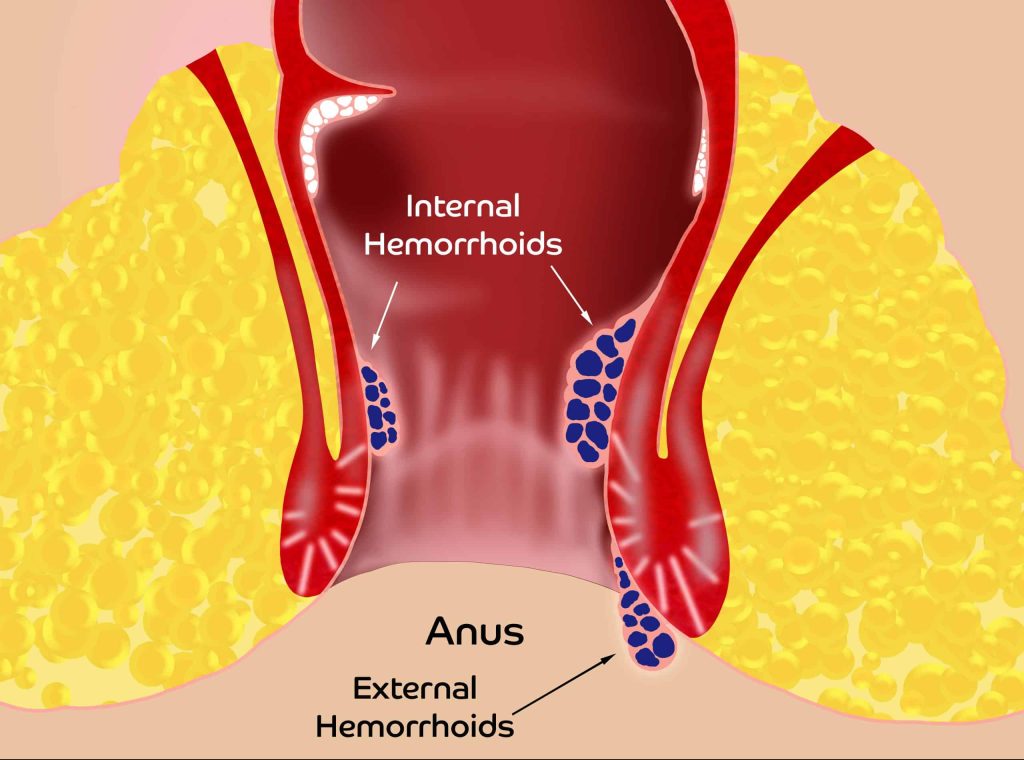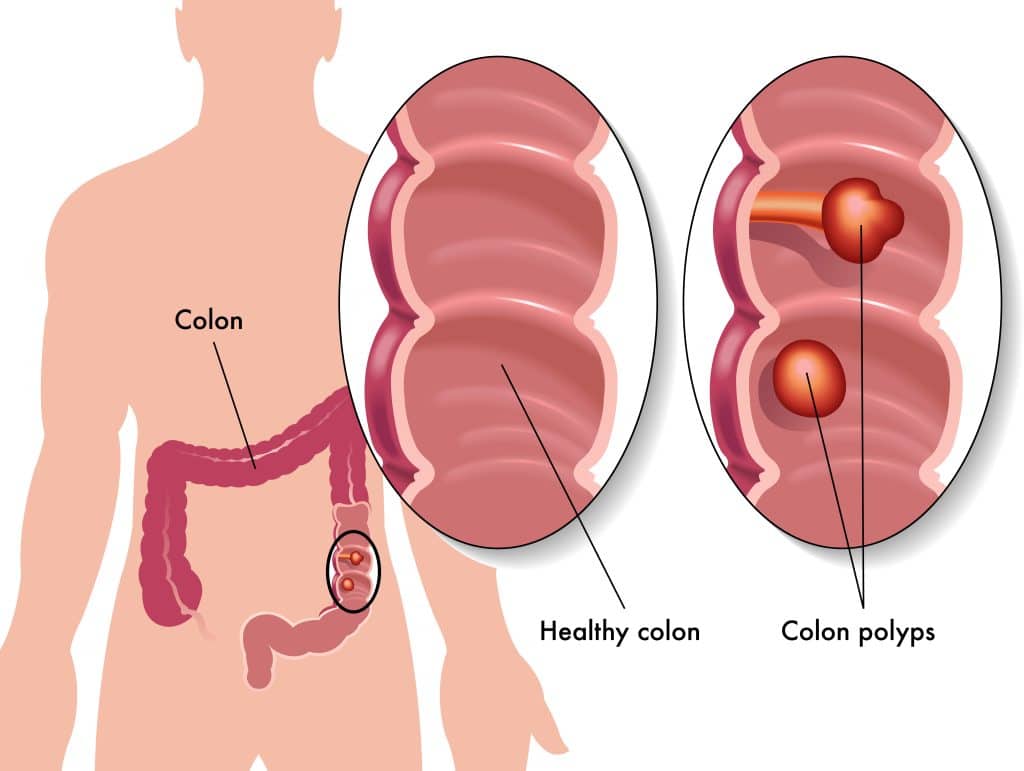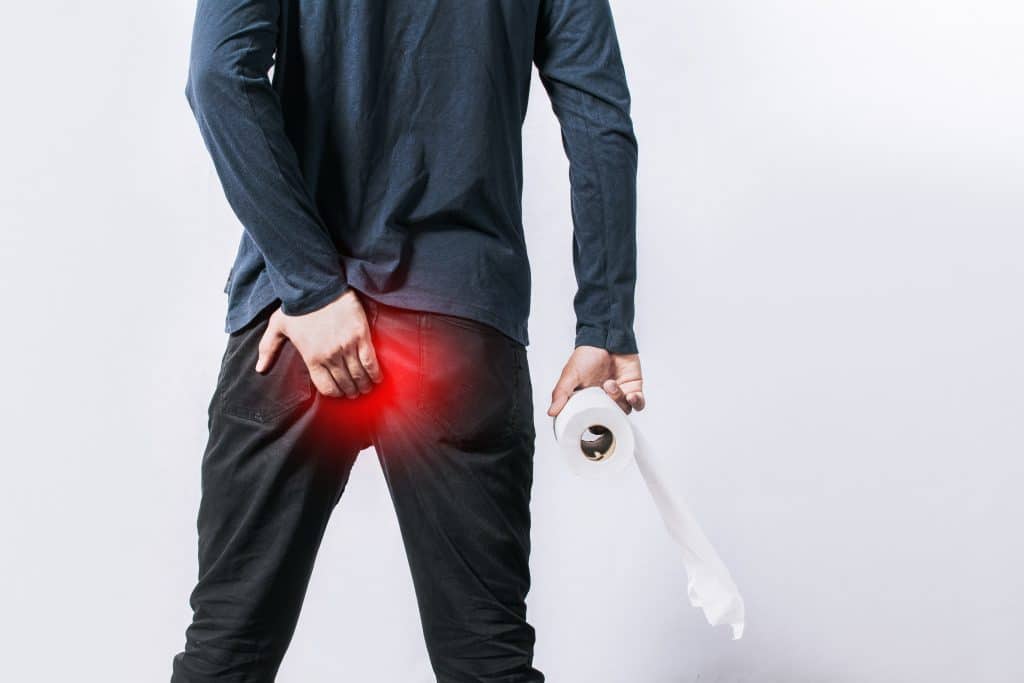Hemorrhoid symptoms are very common among adults and even teenagers; Symptoms include:
- Pain (throbbing, aching)
- Itching
- Painless, bright red, bleeding
- Anorectal pressure
- Prolapse (protrude outside of the anus)
- Tenesmus or the feeling/urge to have a bowel movement.
- Mucous discharge
- Necrosis (the hemorrhoids become trapped outside the anus and the hemorrhoid tissue starts to die). This is a surgical emergency.
If you have hemorrhoid symptoms it is best to see a proctologist as the symptomatic hemorrhoids are usually amenable to painless office treatments. If you are bleeding from the rectum, it is advised you have a colonoscopy to make sure there are no polyps or even cancer within the colon or rectum.
Both hemorrhoids and colon and rectal cancer share similar symptoms, such as rectal bleeding, and if you are experiencing any of the symptoms it’s important to let your healthcare provider know.
Newer data has shown that colon and rectal cancer are rising exponentially in younger Americans. It is estimated that up to 18,000 people younger than age 50 will be diagnosed with colon or rectal cancer.
I can’t tell you how many young patients (younger than 45 and even in their 20’s) who came to see me with bleeding had pre-cancerous polyps found and removed when I performed their colonoscopy. If you think about it, the hemorrhoid bleeding saved their lives as the colonoscopy removed the pre-cancerous polyps which prevented the polyps from morphing into cancer.
Almost every young patient I have seen with colon or rectal cancer had bright red rectal bleeding about 5 years before the diagnosis. Had the patient gone for a colonoscopy it is likely that the polyp which led to colon cancer would have been found and removed.
What are Hemorrhoids?

Hemorrhoids are veins which reside inside and outside of the anus. They are organs just like lungs, heart, kidneys and spleen are organs. Hemorrhoids are venous cushions which have a blood supply (artery which pumps blood into the hemorrhoid) and a venous return (veins which return the blood to the body). They are a part of our anatomy just like our eyes, nose, ears, toes, etc.
We are born with at least 6 hemorrhoids, three within the anus (internal hemorrhoids) and three outside the anal opening (external hemorrhoids). Though we have theories as to the function of hemorrhoids, there is no real scientific evidence of their purpose. It is proposed that the function of hemorrhoids is to aid in keeping stool from leaking out of the anus.
When hemorrhoid veins become inflamed and enlarged they can become symptomatic. The blood pumped into the hemorrhoid is thin and normal, but when the blood enters the inflamed hemorrhoid the inflammatory proteins made by the body thicken the blood so it is difficult to leave the hemorrhoid. This is called chronic venous insufficiency (CVI). With CVI there is more blood leading into the hemorrhoid than returning to the body. Think of a water balloon on a faucet but the balloon has tubes allowing water to flow back to the system. If the water coming into the balloon becomes thick like maple syrup, more water will enter the balloon than will leave the balloon so the balloon becomes bigger. As hemorrhoids become larger they start to cause symptoms.
There are several reasons why hemorrhoid symptoms develop, such as:
- Straining during bowel movements due to constipation
- Urgency to have a bowel movement – diarrhea
- Sitting for long periods of time
- Obesity
- Pregnancy
- Aging
- Chronic bowel issues
- A family history of hemorrhoids.
Symptoms of hemorrhoids:
The symptoms of hemorrhoids include internal hemorrhoid symptoms and external hemorrhoid symptoms. Though patients may experience pain, this pain is a throbbing, aching, toothache type pain, which is different from a fissure pain that tends to be sharp.
Internal hemorrhoid symptoms:
- Throbbing, aching pain around the anus
- Itching
- Painless bleeding
- Anorectal pressure
- Prolapse, a protrusion outside of the anus
- Urgency or the feeling of having to have a bowel movement but no stool comes out
- Mucous discharge
- Necrosis; when the hemorrhoids become trapped outside the anus and the hemorrhoid tissue starts to die). This is a surgical emergency.
External hemorrhoid symptoms:
- Thrombosis; a clot within the hemorrhoid, which causes pain, itching and sometimes bleeding with clots, if the hemorrhoid ruptures. A painful swollen lump that looks like a purple grape is a thrombosed hemorrhoid. 95% of the time thrombosed hemorrhoids will resolve on their own and recurrence in the same spot is unlikely therefore only conservative therapy is needed.
- Necrosis; when the external hemorrhoid becomes thrombotic and due to the pressure in the hemorrhoid the tissue starts to die. This is a surgical emergency.
- Swelling without clotting
-Hemorrhoids can often be managed with lifestyle changes, dietary adjustments, and over-the-counter treatments such as topical creams, ointments, or suppositories.
-In more severe cases or when conservative measures fail to provide relief for internal hemorrhoids, medical procedures like sclerotherapy and rubber band ligation may be recommended by your proctologist.
What are the Symptoms of Colon and Rectal Cancer?
Colon and rectal cancer are cancers that occur within the colon and rectum (last part of the large intestine). They are referred to as colorectal cancer.
The below 3 symptoms of colon or rectal cancer overlap with hemorrhoid symptoms. Such overlapping symptoms include bright red bleeding, rectal discomfort or pain and tenesmus (see below). Due to the increased risk of colon and rectal cancer in younger patients, rectal bleeding is an indication for the patient to have a colonoscopy even if the bleeding is bright red and felt to be due to hemorrhoids.
- Painless, bright red, bleeding
- Rectal discomfort or pain
- Tenesmus or the feeling/urge to have a bowel movement
However, colon and rectal cancer have several other signs and symptoms which are concerning for cancer such as:
- Change in bowel habits
- Blood in stool
- Narrow stool
- Abdominal pain
- Unexplained weight loss
- Weakness or fatigue
- A feeling that your bowel doesn’t completely empty when you use the bathroom
There are several other conditions that have similar symptoms to colon cancer, aside from hemorrhoids, including Ulcerative Colitis and Crohn’s disease. If you experience rectal bleeding, it’s important to tell your proctologist so they can diagnose you properly.
What Is a Polyp?

A polyp is an abnormal, benign growth in the colon. It is felt the polyps come from environmental factors such as the preservatives and pesticidal/fungicidal sprays in our food. Excessive meat consumption and alcohol consumption is linked to increased risk of rectal cancer.
Polyps can be precancerous or non-precancerous. 95% of colon and rectal cancer comes from polyps and only 5% are genetic. Since colon cancer rates are rapidly climbing in younger patients and we know the majority of colorectal cancer comes from polyps, any patient with bright red bleeding requires a colonoscopy to look for and remove polyps. By removing the precancerous polyps colon cancer will not form from these polyps.
Are Hemorrhoids and Colon Cancer Related?
It is a common misconception that hemorrhoids are a sign of cancer. The truth is that hemorrhoids do not lead to colon or rectal cancer. If you are experiencing any hemorrhoid symptoms, even if they resolve spontaneously or with over the counter remedies, it is important to see a proctologist for an evaluation to rule out serious conditions such as colon, rectal or anal cancer.
Although hemorrhoids are not a sign of colon cancer, the symptoms overlap and therefore those who do experience hemorrhoids have been found to have a high risk of colon cancer by 0.94%. It is not that the hemorrhoids led to cancer, it is that the patient’s with hemorrhoid symptoms who underwent a screening colonoscopy were found to have cancer. This is why it is important to see a proctologist for rectal bleeding.
It’s better to have a colon and rectal cancer screening early and remove polyps than wait to have the polyps lead to cancer with the risk of distant spread. Many people will also experience rectal bleeding as a symptom of hemorrhoids and not think twice of it, even though it can also be a sign of colon cancer.
Any rectal bleeding should be discussed with a proctologist because it could be a sign of colon or rectal cancer.
How to Tell the Difference Between Hemorrhoids and Colon Cancer
Colon cancer and hemorrhoids have many overlapping symptoms (see above), and because of this there is no way to rule out colon cancer without a thorough examination and a colonoscopy.
Symptoms that do not overlap between hemorrhoids and colon cancer and are more concerning for colon or rectal cancer include:
- Change in bowel habits
- Blood in stool
- Narrow stool
- Abdominal pain
- Unexplained weight loss
- Weakness or fatigue
- A feeling that your bowel doesn’t completely empty when you use the bathroom
When Should You See a Proctologist?

Any unusual change in your bowel habits, pain that won’t go away, or rectal bleeding, should be discussed with a proctologist. He/she can perform an anoscopy in the office and if internal hemorrhoids are the cause painless therapy can be performed to stop the bleeding.
Dietary recommendations are also given to help keep the stools regular which will help to minimize hemorrhoid symptoms. Addition of PERFECT P.O.O.P. raw psyllium fiber is a great source of fiber to improve stool size, shape, girth and regularity. He/she can also perform a colonoscopy to find and remove precancerous polyps. You should also speak to your proctologist about a colon cancer screening if you are age 45 and over without a history of bleeding,polyps, Ulcerative Colitis, Crohn’s, or family history of colon cancer or polyps. If you have any of these then a colonoscopy is required before age 45. .
Although hemorrhoids are not a sign of colon cancer, it is important to see if there is something else at play as colon and rectal cancer rates are rising rapidly in younger patients (younger than 50).
Conclusion
If a person has bright red bleeding from hemorrhoids it is imperative to see a proctologist. Not only will the doctor be able to make the diagnosis and treat the hemorrhoids, a colonoscopy will be advised. When the patient has the colonoscopy and a pre-cancerous polyp or polyps are found and removed, colon cancer and/or rectal cancer can be prevented. This is how your hemorrhoids can save your life.

